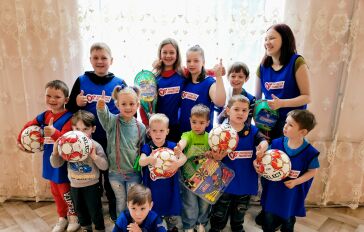
Vladyslava Kurinna — practical psychologist, fairy tale therapist, co-founder of the «Support the Child» project talks about the importance of regular taking care of children and gives practical advice to parents
From now on, every Ukrainian child knows how the air-raid alarm sounds, what the taste of a mother’s fear is, how it is to play gloomy hide-and-seek in the bathroom or basement, or probably never see a favorite toy. But adults need to remember that this new experience doesn’t mean a lost childhood. You can preserve it. Games and interesting exercises can bring bright colors to the life of a child during wartime.
The proper games can help to relax a child’s mind, reduce stress, give positive emotions and encourage. The child’s excitement is a mirror of parental emotions. If the mother and father are calm, the child is also calm.
Adults need to choose simple activities (house cleaning, cooking, volunteering, etc.) to distract from the newsfeed, and games can also help children to distract.
The game is the same magic wand that parents dream of, and which will help in raising a child. From the age of three to seven, the game becomes the leading activity for every kid. This means that playing helps children to develop their cognition, emotional and volitional states as well as communication skills, and so on. Games allow learning the model of social relations and the rules of interpersonal relations. Our children play mother-daughter, hospital, firefighters, etc., because that’s how they learn to be “adults”. The child grows up, but the game does not lose its value.
Why is it so important to keep on learning children during the war?
— The game can reproduce reality in a more acceptable form to the child. Staying in a bomb shelter can be diversified by playing as primitive people who build houses (you can make something out of blankets and pillows), or by eating special sandwiches to gain super-power and dance wild dances.
— The child can express the feelings and fears through the games or tell his mind on behalf of a favorite doll or robot, so parents can assure the child that everything will be fine: “Mom, the bear is very scared that he can not find me if we are separated.” ” My dear, tell the bear that he will never lose you because you love and protect him. And I’m with you, so I can protect you both.”
— Games mean entertaining. Laughter and interest in life help to minimize psychological trauma. After all, the child’s psyche is flexible and, among other things, chooses what is more important.
Top 5 games you can play every day
Each game has its own purpose: the development of thinking, attention, imagination, communication skills, relieving physical stress, etc. And it is important to offer the child a relevant game. In the telegram channel “Support the child” my colleagues and I post daily sets of games, here are some of them:
1. «Magic Room». An active game that will help to relieve physical tension and relax muscles.
Rules: Tell your child about the magician in whose room you are staying right now. He is not at home at this moment. But the room is unusual and enchanting. It looks different every next moment. So the room turns into a desert (we start moving with the child as if in the desert, jumping on the burning sand); but now we are in the aquarium (start swimming), and here we are on the rock (imitating the climbing); then we imagine more and more new places and start moving correspondingly.
2. «What has changed?». This game will help to develop attention and memory.
Rules: put a few objects in front of the child (a doll, a set of geometric figures, colored pencils, etc.), and ask him to remember. After the child turns away, you change 1 element of the set (change their places, change the doll’s hair, add a geometric figure, etc.). The child must find out what has changed.
3. «What would happen if»? (Author: Gianni Rodari). A game that promotes the development of imagination and creativity.
Rules: let your child ask questions and give detailed answers.
– What would happen if dogs could fly?
– What would happen if the sea could sneeze?
– What would happen if elephants joined you for breakfast?
– What would happen if all the T-shirts turned into books?
4. «Story 2.0». A game with elements of fairy tale therapy develops the imagination and can have a therapeutic effect.
Rules: Ask your child to write a story about what can be the next in his favorite fairy tale. You can think of what the main character of the story would do in a specific situation, being in a bomb shelter for example? Such a game can help a child to spill their experiences into history and find answers to problematic questions.
5. Morning exercise that gives you an energy boost for the whole day (Author – Olga Babyak)
An apple tree bloomed in our garden
And raised its branches to the sun. (imitate movements)
And the flowers on the branches nod their heads, (imitate the movements)
Looking for the bees to grow good apples. (imitate movements).






